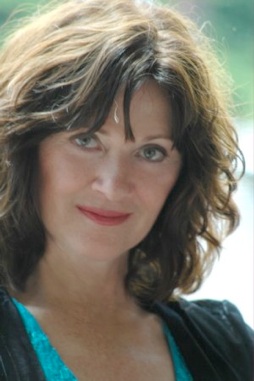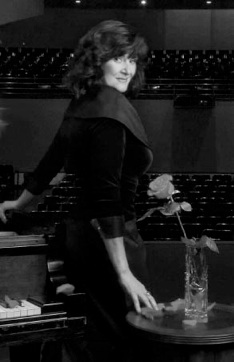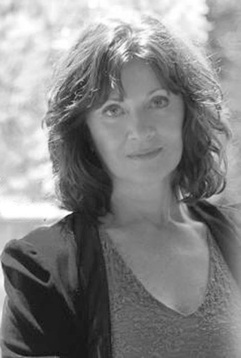Karen Marie Garrett’s story is quite different from most of the other composers I have interviewed. As a teenager, Karen’s dream was to become a classical pianist, a career her parents refused to let her pursue. As an adult, she didn’t have a piano for twenty years, but tragedy brought her back to music as a form of solace and sanctuary. Her first CD,
Pensare Piano (2002), was a collection of classical piano pieces, but she started composing her own music that same year. Her next two CDs,
Allure of Sanctuary (2005) and
It’s About the Rose (2007) are mostly original compositions and were produced by Will Ackerman, founder of Windham Hill Records. Both albums hit the top of the new age charts and stayed there. A passionate and driven pianist from a very young age, it’s fascinating to learn that Ms Garrett only started improvising about eleven years ago, and composed her first piece about six years later.
Karen Marie Garrett was born and raised in Vancouver, Washington. Her father worked in a local paper mill. Her mother was an RN, but was unable to work because of Cronin’s disease, which required frequent surgeries and hospitalization, and left her in a great deal of pain. Karen has a slightly younger brother, and the two are very close. Karen currently resides in Olympia, WA.
Karen and I had a delightful phone interview in early March, and some of the questions she answered by email before that are mixed in. I think you will enjoy getting to know her, too!
KP: How old were you when you started piano lessons?
KG: I was five. A few years later, I was accepted by the top piano teacher in the area, Carolyn O. James, who was an accredited instructor with the Sherwood Conservatory of Music in Chicago. At the time of my audition, I was the only student selected to study under Ms. James to follow the conservatory’s study program. When I was ten, she took me to a concert by preeminent classical pianist Van Cliburn and the experience inspired me to fully commit to piano studies and practice. My constant practicing became such a problem that my family moved my bed and piano into a special room on the far side of the house so I could practice anytime I wanted to.
KP: Did you actually play any time of day or night?
KG: I did. I really loved it and just could not get enough.
KP: Were you encouraged to improvise or compose by your piano teacher?
KG: Ms. James did encourage me to improvise, but I preferred to focus on classical composers’ works (Beethoven, Chopin, Mozart, and Schubert, primarily) at that time. I loved classical music and still do!
KP: At what point in your life did you know that you were going to be a professional musician?
KG: I knew it early; I was around twelve at the time. I worked hard for years and wanted very much to be a classical pianist. Later on my parents would not support the concept and were against my becoming a professional musician. I believe they were afraid for me. Unfortunately, it eventually became a wedge between us and without their support, I felt my dream was hopeless. I did forgive them later, but I certainly wasn’t happy with them at that time.
KP: It seems odd that they would get you a top teacher and then not let you pursue music.
KG: I think the turning point for them was when they realized music study would take me away from home at an early age. I was just sixteen when my teacher recommended I finish my education at the conservatory in Chicago.
KP: When you did concerts as a younger person, were they all classical music?
KG: Yes. That was until I was about twenty years old. After I married my high school sweetheart, I did not own a piano for twenty years. I enjoyed family life and worked as an accountant. My husband encouraged me to rent a piano a couple of times, but when a piano was in the house, that’s all I wanted to do. It disrupted our family life, and I felt it was taking too much time away from my husband and son. So, the pianos were always returned.
In 1994, my husband died of cancer; a terrible tragedy for our family. I was emotionally distraught and alone, as our son was grown and out of the house. The first thing I thought of was getting a piano to help me through that period. I took the heartache of loss and poured that emotion into my music. It made me feel I was doing something constructive and helped me deal with the pain. Music became my sanctuary and made me happy again, and I thought, “I’m not going to hurt anyone by pursuing this, so now is the time.” I moved into a small cottage on the dunes near Oysterville, Washington, and placed my piano in the dining room by picture windows facing the ocean. It was a very inspirational and spiritual space where I first began to compose my own music. After five years, I returned to Olympia to be closer to family, shorten the travel distance to airports for planned studio recordings, and less rain {laughing}.
KP: You started improvising about eleven years ago. After playing classical music for all those years, what freed you to start improvising?
KG: I could no longer find sheet music that expressed what I wanted I wanted to communicate. It was a very slow process for me because I’m such a purist to classical music and so particular about making sure I hit every single note. It was difficult for me to go outside of that box.
KP: I’ve never been able to do it, but I’ve had several other composers say you just have to give yourself permission.
KG: That’s exactly what you have to do. I forced myself to improvise every single day. It was not fun and felt like I had returned to kindergarten. I would treat myself following an improvisation session with sight-reading classical music. With continued work, the improvisation evolved and now feels natural. I look back at that experience and laugh.
KP: Before you started improvising, did you ever hear your own music in your head?
KG: No, that didn’t come until later. It’s difficult to describe. It’s a combination of hearing, visualizing, color, and most importantly for me it’s about emotion.
KP: That’s really interesting. Have you done any paintings or anything like that?
KG: No, I haven’t. I assume I’d be very bad at it because I’m terrible at drawing.
KP: {laughing} Maybe you have to give yourself permission to do that, too!
KG: There you go! {laughing}
KP: Your recordings are a combination of composed and improvised music. Do you find that your composed music stays about the same when you play it, or do those pieces constantly evolve?
KG: They constantly evolve.
KP: Do you write any of your music out on paper?
KG: I write out structure and music for my own use.
KP: But you don’t plan to do sheet music?
KG: It’s not that I don’t want to provide sheet music - I just don’t have the time right now and think it’s important to focus on performances for now.
KP: Do you do concerts very often?
KG: I’m working on it and receive a ton of email from fans wanting me to perform in their area. I don’t know that I want to do heavy tours, but several concerts per month would be lovely.
KP: How did you connect with Will Ackerman?
KG: I emailed him! I asked if he would accept a demo recording.
KP: How did you choose Skywalker Studios for recording your most recent CDs?
KG: I’m a piano snob! I think you can appreciate that. It doesn’t have to be a particular brand - it’s the piano. I just hate, and I mean HATE, playing on a bad piano. It definitely affects the outcome of a performance if the piano is inferior. For the recordings, Will had a couple of studios he suggested I check out in California, so I took a trip to scope out different studios and their pianos. I fell in love with the 9’ Bluthner at Skywalker. It has extra strings that are not sustained and catch all that vibration in the harp. It’s an incredible instrument. I would love to do another album there.
KP: You started composing only about five years ago and already have two critically-acclaimed CDs of original music. Have you recorded all of your compositions?
KG: I’m always working on new compositions, and ready to record more.
KP: It’s always there?
KG: Right now it seems to be.
KP: Are you going to do another album this year?
KG: I don’t know that I’m going to be able to do that, but I will as soon as possible. I’d love to start recording another album. The only thing holding me back is funding; it’s an expensive process to do it right.
KP: You said you were going to try to approach films and television with your music. Are you going to try it with music you have already recorded?
KG: Yes. I’m going to start there, and then would love to do some projects with film and TV. I really think it’s a nice fit for my music.
KP: You said that one of your most exciting musical moments was “the overwhelming experience of having a composition appear while sitting at the piano.” Let’s talk about that.
KG: It’s emotional when that happens, and generally brings me to tears. I don’t know how to explain it, Kathy. I might be working on something that just isn’t coming together, or just received a new inspiration, and all of a sudden there’s this huge, overwhelming emotion, and the music is just there. When it happens, it’s amazing and I’m thankful!
KP: Does that happen very often?
KG: I’m fortunate in that it does happen quite often.
KP: Do you usually have a tape recorder on when you’re playing?
KG: No.
KP: So you’re able to bring the music back after you’ve created something?
KG: I write the structure down right away.
KP: Do you ever dream any of your songs?
KG: I do.
KP: Do you have to get up and go play them?
KG: {laughing} I do! It’s a good thing it’s just me and the dog!
KP: You have to grab it while it’s there.
KG: That’s my feeling, and it seems to be working for me. What really inspires me about music is wanting to touch people and explore. When an idea comes to mind, I’m driven to work on that until I get it down. I work very hard and many hours.
KP: Do you still teach very much?
KG: I don’t teach often. I don’t mind teaching as long as it’s somebody who is dedicated to what they’re doing.
KP: That’s pretty rare anymore.
KG: I don’t take a student who is not willing to work. It’s a waste of my time and their money. I seldom teach, but I enjoy it when I do. I’m here to open the door and let you find what you need to do with your music. I have to tell you that the first two years of my piano study, my mother made me practice.
KP: Mine did, too!
KG: I didn’t want to practice! Learning the piano is hard and it needs to be worked on every day. When I saw Van Cliburn in concert at age ten, it was like a light bulb went off, and I thought, “Wow! I want to do that!”
KP: That’s exactly why I’ve had so many composers come here to play for my students, but I have a really hard time getting anyone to come to the concerts.
KG: You’re kidding! That has to be really discouraging!
KP: It is! Do you have any hobbies?
KG: Walking Abbey, my black lab, getting together with friends and family, and gardening. I also enjoy sailing, but haven’t done that in some time.
KP: If you could have any three wishes, what would they be?
KG: Continued good health, happiness, and freedom.
KP: Do you have any words of advice for young people who are studying music now?
KG: Learn from those who inspire you, and be grateful for their wisdom. Then listen to your instincts, be brave, and never forget your dream.
Many thanks to Karen Marie Garrett for sharing with us! For song samples and to learn more about this wonderful artist, visit
her website or her
Artist Page right here on MainlyPiano.com.
Kathy Parsons
March 2007



